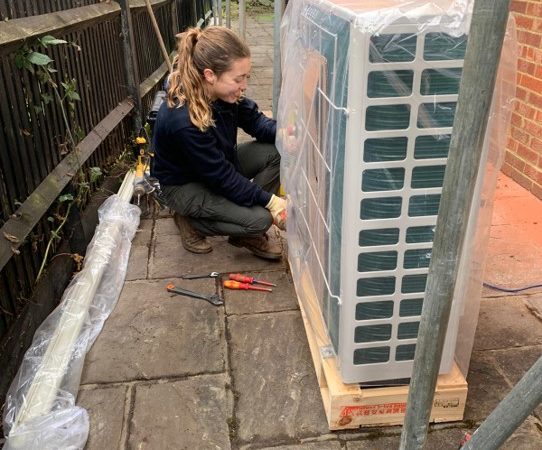
Women tradespeople have gone against the grain to build careers in the industry* and, as new entrants, face various hurdles – not having the appropriate workwear available, having to work harder to prove themselves than their male peers, not having access to female toilets and sanitary disposal etc. In the fight for equality, the latest statics are disappointing: 78% of UK tradeswomen have experienced discrimination, and women plumbers/heating engineers get paid 61% of what men do (Women on the tools research document, 2022, and Rated people home improvements trend report, 2022).
* For plumbing and heating specifically, women make up less than 2% of the work force.
The energy transition is going to require significant, disruptive and costly changes to people’s homes. So, the fact that the gas engineer workforce is aging and male dominated, is potentially a real barrier to the transition; the workforce will need to go into people’s spaces, engage with them on their priorities and circumstances, and be trusted by them to make the changes. To reach all sections of society, on this divergence from business as usual, we will need more diversity of thought and for the industry to better represent our diverse society (not just for gender, but across the board).
A specific example of the effect of diversity on the workforce is the register for tradeswomen, which exists for women who have suffered from domestic abuse – supporting vulnerable women to have any home improvements they might need and become more independent. I’m told the service is currently oversubscribed and desperately needs more tradeswomen to supply to the demand.
It is also a problem that the workforce is shrinking, because we don’t have the supply chain to carry out the work needed:
“Though there is potential to train new professionals and to retrain those with existing skills in heating and plumbing, the heart of the challenge is that there is, at present, little real market or demand for energy efficiency and retrofit. When there is consistent demand for energy efficiency and low carbon heating driven by incentives and regulation, supply chains will develop and people will train or upskill to deliver against demand.” – Regen paper: The local delivery of clean heat, Levelling up heat decarbonisation, July 2022
However, the situation also presents us with a really cool opportunity… we can use the change in tack from gas to green heat as extra momentum to redefine what careers in this industry look like, undo the damaging stereotypes, and encourage young people into the industry who are motivated by climate change.
Regen runs a network and mentoring scheme for women in renewables, ReWIRE, because we know how important representation and role models are for people breaking into male dominated spaces. And so, for the same reason, it is critical that we see more support for and championing of tradeswomen. Check out what Stopcocks, Women and Trade, Rated people are doing on this – it’s awesome. We need to make sure that any clean heat campaigns we run, promote diversity in the industry. Tradeswomen should be a key element of the clean heat transition narrative.
